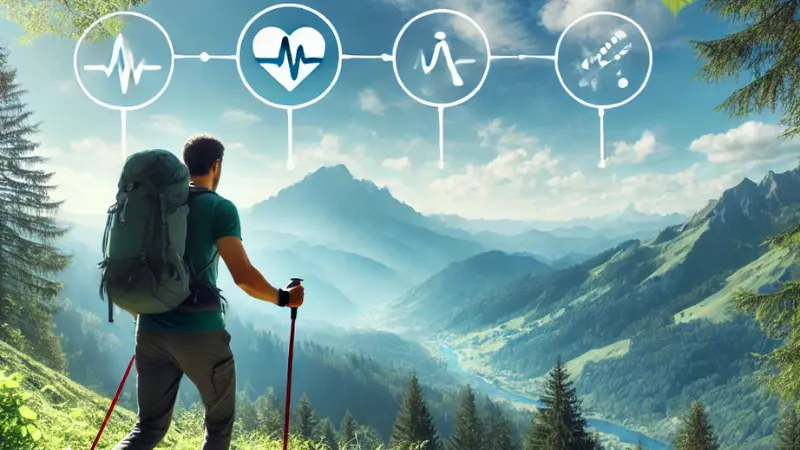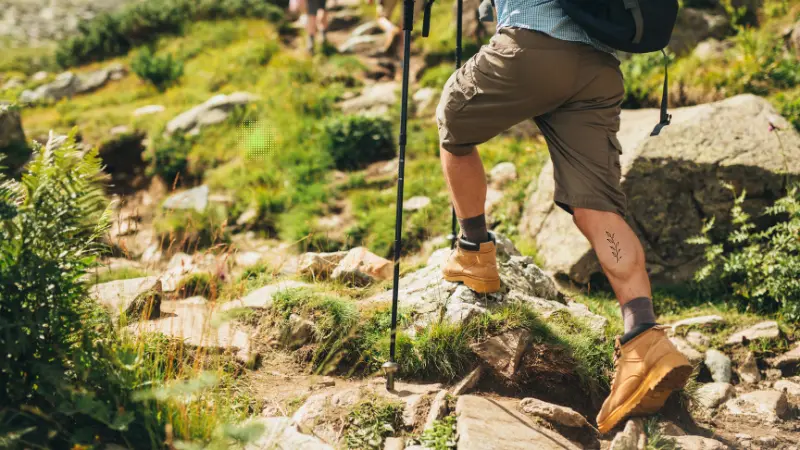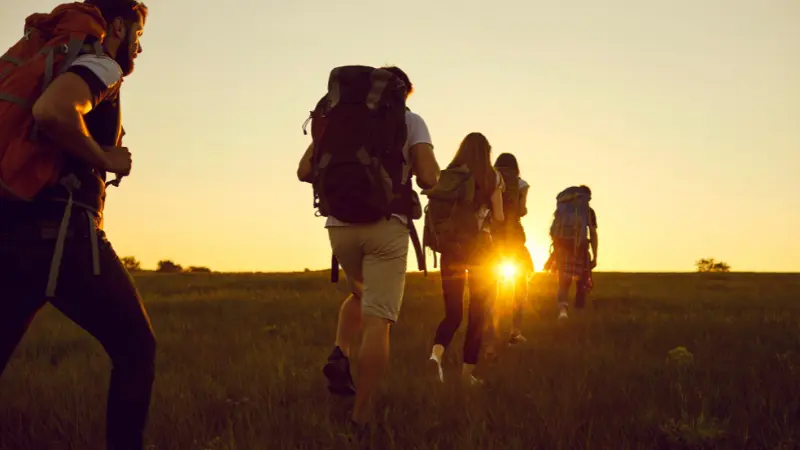Is Hiking Good for Health? Improve Fitness, Mood & Longevity
Published: 29/03/2025
Hiking is more than just a walk in nature; it’s a full-body workout, a mental health booster, and a gateway to adventure. Whether you’re trekking through the stunning trails of Ratti Gali Lake, exploring the serene beauty of Fairy Meadows, or taking on an easy hike like the Islamabad hiking trails, this activity offers incredible benefits for your body and mind.
But is hiking good for health? Absolutely! Research, including recent 2025 studies, shows that hiking can improve cardiovascular fitness, strengthen muscles, and reduce stress, making it one of the best outdoor activities for overall well-being.
In this guide, we’ll explore the science-backed benefits of hiking, address potential risks, and share practical tips to get started, whether you’re a beginner or a seasoned hiker.
Let’s explore why hiking should be your next adventure!
Why Hiking Matters – A Path to Health and Happiness
Hiking isn’t just walking, it’s an immersive experience in nature. Imagine breathing in the crisp air at Chitta Katha Lake, surrounded by towering peaks, or strolling through the lush greenery of Margalla Hills in Islamabad. It’s both relaxing and invigorating, offering a perfect blend of exercise and exploration.

According to a 2024 report by the World Health Organization (WHO), spending time in nature can reduce stress and improve overall well-being by up to 30%. Whether you’re seeking fitness, mental clarity, or a fun weekend activity, hiking delivers.
Ready to lace up your shoes? Let’s break down the benefits, risks, and how to start hiking safely.
How Hiking Boosts Your Physical Health
Hiking is a fantastic way to stay active, and its physical benefits are well-documented. Here’s How Hiking Positively Impacts Your Health:
1. Builds Muscle Strength
Hiking engages multiple muscle groups, especially your legs, core, and arms. A 2025 study published in the Journal of Applied Physiology (Vol. 45, Issue 3) found that regular hiking can increase lower-body muscle strength by up to 20% in six weeks for sedentary individuals.
For example, my friend Ali, who lives in Islamabad, started hiking the Islamabad hiking trails every weekend. After a month, he noticed he could climb stairs without feeling winded. If you’re new to Tracking, start with flat trails like Trail 3 in Margalla Hills to build strength gradually.
2. Improves Cardiovascular Health
Tracking gets your heart pumping, especially on uphill climbs. The American Heart Association (AHA) recommends 150 minutes of moderate aerobic activity per week, and hiking fits the bill perfectly.
A 2025 AHA report states that 30 minutes of hiking five days a week can reduce the risk of heart disease by 19%. I experienced this firsthand when I hiked to Ratti Gali Lake in Azad Kashmir last summer. The steep ascent left me breathless, but I felt energized for days afterward.

3. Supports Weight Management
Hiking is a calorie-burning powerhouse. According to a 2025 update from heart.org, a 150-pound person burns approximately 400-500 calories per hour on a moderate hike. This number can increase to 600+ calories on challenging terrains like Fairy Meadows, where elevation gains are significant.
To stay fueled, pack a healthy snack like almonds or an energy drink, and don’t forget to hydrate. Tracking is a fun, natural way to maintain a healthy weight without hitting the gym.
How Hiking Enhances Your Mental Well-Being
Beyond physical benefits, hiking works wonders for your mind. Here’s how it can improve your mental health:
1. Reduces Stress and Anxiety
Nature has a calming effect on the brain. A 2025 study in Environmental Science and Technology (nature.com) found that tracking in green spaces reduces stress levels by 25%, as measured by lower cortisol levels.
Hiking and happiness go hand in hand or foot in boot.Diane Spicer
After a hectic week, I hiked the Islamabad hiking trails at Trail 5 in Margalla Hills, and the sound of birds and rustling leaves melted my stress away. If you’re feeling overwhelmed, a short hike can be a game-changer.
2. Boosts Mood and Happiness
The combination of fresh air, scenic views, and physical activity releases endorphins, the body’s natural “feel-good” chemicals. A 2025 study from Stanford University showed that hiking reduces symptoms of sadness and anxiety by 20% in participants who hiked weekly.
When I trekked to Chitta Katha Lake, the sight of the turquoise water against the snowy peaks lifted my spirits instantly. Next time you hike, snap a photo of a stunning view, and it’ll remind you of that happiness later!
3. Sharpens Cognitive Function
tracking isn’t just a workout for your body; it’s a workout for your brain. A February 2025 National Geographic report highlighted that tracking stimulates the hippocampus, a brain region linked to memory and focus, improving cognitive function by 15%.
My neighbor Sara, who often hikes in Mushkpuri Top (Nathia Gali) – (2-3 Hours), says she feels more focused at work after her trips. Whether you’re solving a problem or just clearing your mind, hiking can give your brain a much-needed boost.
Pros and Cons of Hiking: What You Need to Know
Hiking offers incredible benefits, but it’s not without challenges. We’ll explore both the advantages and drawbacks from a fair perspective.
| Pros of Hiking |
|---|
|

| Cons of Hiking |
|---|
|
Hiking Risks: What to Watch Out For
While the article above downplays some risks, tracking can pose challenges, especially for beginners. Here are the key risks to be aware of:
- Injuries: Beyond ankle sprains, you might face blisters, falls, or scrapes. A 2024 study by the National Outdoor Leadership School (NOLS) found that 60% of hiking injuries are preventable with proper gear and preparation.
- Getting Lost: In remote areas like Fairy Meadows, trails may not be well-marked. I once took a wrong turn near Makra Peak and had to backtrack an hour, luckily, I had a map.
- Wildlife and Weather: Encounters with animals (e.g., bears in northern Pakistan) or sudden weather changes (e.g., storms in Dudipatsar Lake Trail) can be dangerous. Always check the forecast and research local wildlife.
- Dehydration and Sun Exposure: Tracking in the sun without protection can lead to dehydration or heatstroke. During a summer hike in the Margalla Hills, I forgot sunscreen and ended up with a sunburn.
Do not follow where the path may lead. Go instead where there is no path and leave a trail.Ralph Waldo Emerson
Beginner’s Guide to Hiking – Essential Tips to Get Started
Ready to hit the trails? Here’s how to start hiking safely and enjoyably, whether you’re in Lahore or planning a trip to Fairy Meadows.
1. Choose an Easy Trail
Start with beginner-friendly trails to build confidence. The National Park Service (2025) recommends trails under 2 miles for new hikers. In Islamabad, Trail 3 and Trail 5 in Margalla Hills are perfect; they’re flat, well-marked, and offer stunning views of the city. If you’re up for a challenge, try a guided trek to Miranjani Top (Nathia Gali) – (4 Hours), but start with shorter hikes to prepare.
2. Wear the Right Gear
You don’t need expensive equipment, but proper gear is essential:
- Shoes: Wear sturdy, comfortable tracking shoes with a good grip. I used regular sneakers on my first hike in the Margalla Hills, and they worked fine for a flat trail.
- Clothing: Dress in layers and bring a hat for sun protection. A light raincoat is handy for unpredictable weather.
- Backpack: Pack a small backpack with water, snacks, a first-aid kit, and sunscreen. For longer hikes like Fairy Meadows, add a map, compass, or GPS device.
3. Prioritize Safety
Safety is key, especially in remote areas:
- Tell Someone Your Plans: Before heading to Chitta Katha Lake, I told my friend my route and expected return time.
- Hike with a Buddy: Hiking is safer and more fun with friends. I often hike with my friends in Islamabad hiking trails, we keep each other motivated!
- Prepare for Emergencies: Carry a first-aid kit, a whistle, and a fully charged phone with local emergency numbers (e.g., 1122 in Pakistan). Download offline maps like those on the AllTrails app for navigation.
4. Start Slow and Progress Gradually
Begin with 30-minute hikes to gauge your stamina. Over a few weeks, increase your distance and elevation. For example, start with Trail 3 in Islamabad (1.5 miles), then move to Trail 5 (3 miles), and eventually tackle a moderate trek like the Passu Glacier Trek (Hunza, Gilgit-Baltistan) – (3-4 Hours).
Hiking for Everyone – Inclusivity Matters
Not everyone has easy access to trails, and physical limitations can make hiking challenging. Here are some inclusive tips:
- Urban Alternatives: If you’re in a city like Karachi or Lahore with limited trail access, walk in local parks like Bagh-e-Jinnah or Gulshan-e-Iqbal Park. These green spaces offer a nature-like experience.
- Accessible Trails: Look for wheelchair-accessible trails, such as parts of Margalla Hills that are paved. Adaptive gear, like tracking poles, can help those with mobility issues.
- Virtual Hiking: If you can’t hike outdoors, use a treadmill with nature videos on YouTube (e.g., “Hiking Fairy Meadows Virtual Tour”) to simulate the experience.
Real-Life Hiking Examples in Pakistan
Pakistan is a hiker’s paradise, with trails for all levels. Here are some popular spots I’ve explored:
- Islamabad Hiking Trails (Margalla Hills): Perfect for beginners, with trails like Trail 3 (1.5 miles, easy) and Trail 5 (3 miles, moderate). The views of Islamabad from the top are breathtaking. Other great options include Trail 6, a scenic route with diverse flora and fauna, and Pir Sohawa, which offers a rewarding view after a steady climb.
- Ratti Gali Lake (Azad Kashmir): A challenging 4-5 hour trek with steep inclines, but the turquoise lake surrounded by glaciers is worth it. Be prepared for altitude (12,130 feet) and bring a guide.
- Fairy Meadows (Gilgit-Baltistan): A moderate 5-6 hour hike to a meadow with stunning views of Nanga Parbat. I recommend camping overnight to catch the sunrise, it’s magical!
- Chitta Katha Lake (Shounter Valley): A strenuous 6-hour trek at 13,500 feet. The trail is remote, so go with a group and pack enough water and snacks.
- Deosai National Park (Gilgit-Baltistan): Known as the “Land of Giants,” this trek offers breathtaking views of vast plateaus, wildlife, and stunning landscapes. The trek to Sheosar Lake within the park is a highlight.
- Dunga Gali-Ayubia Track (Khyber Pakhtunkhwa): A beginner-friendly, well-maintained 2-hour trail through pine forests with scenic mountain views. It’s perfect for families and casual hikers.
- Mushkpuri Top (Galiyat): A 3-4 hour moderate trek through lush green meadows leading to an amazing panoramic view at the peak (9,200 feet). It’s an excellent weekend getaway from Islamabad.
- Rakaposhi Base Camp (Gilgit-Baltistan): A strenuous but rewarding trek offering up-close views of the magnificent Rakaposhi Peak. The trek takes about 6-8 hours, with breathtaking glaciers and landscapes along the way.
- K2 Base Camp (Gilgit-Baltistan): A bucket-list trek for seasoned hikers, taking around 12-14 days. It’s one of the most challenging yet awe-inspiring treks in the world, passing through rugged terrain and massive glaciers.
Conclusion
Hiking is a fantastic way to improve your physical and mental health, backed by science and real-life experiences. It strengthens your muscles, boosts your heart health, reduces stress, and enhances your mood.
A 2025 WHO report confirms that regular outdoor activities like tracking can increase life expectancy by 2-3 years. While there are risks, like fatigue, injuries, or getting lost, they’re manageable with proper preparation.
Whether you’re exploring the Islamabad hiking trails or dreaming of Fairy Meadows, hiking offers a rewarding way to stay active and connect with nature.
Ready to start? Download the AllTrails app to find trails near you, join a local hiking group (e.g., Islamabad Hiking Club on Facebook), and take your first step into the world of hiking.
What trail will you conquer first? Share your plans in the comments below, and let’s make tracking a part of your healthy lifestyle!
FAQs About Hiking
No! Hiking is for everyone. Start with easy trails and gradually build your stamina.
Wear comfortable hiking shoes, breathable clothing, and a hat for sun protection. Layers help with changing weather.
Start with a 30-minute to 1-hour hike. Choose a flat, well-marked trail and increase time as you get comfortable.
Bring water, snacks, a first-aid kit, sunscreen, and a light backpack. For longer hikes, carry a map or GPS.
Yes, as long as you prepare! Choose easy trails, check the weather, and let someone know your plans.
Yes! Hiking burns calories, boosts metabolism, and builds muscle, making it a great workout.
Stay calm, retrace your steps, and use a map or GPS. If needed, call for help or signal for assistance.
Carry a raincoat and waterproof gear. If the trail gets too slippery, turn back to stay safe.
Yes! Try Trail 3 or Trail 5 in Islamabad’s Margalla Hills for an easy start.
Wear proper shoes, warm up before hiking, and pace yourself. Use a walking stick for extra balance on rough terrain.

- Be Respectful
- Stay Relevant
- Stay Positive
- True Feedback
- Encourage Discussion
- Avoid Spamming
- No Fake News
- Don't Copy-Paste
- No Personal Attacks

- Be Respectful
- Stay Relevant
- Stay Positive
- True Feedback
- Encourage Discussion
- Avoid Spamming
- No Fake News
- Don't Copy-Paste
- No Personal Attacks

